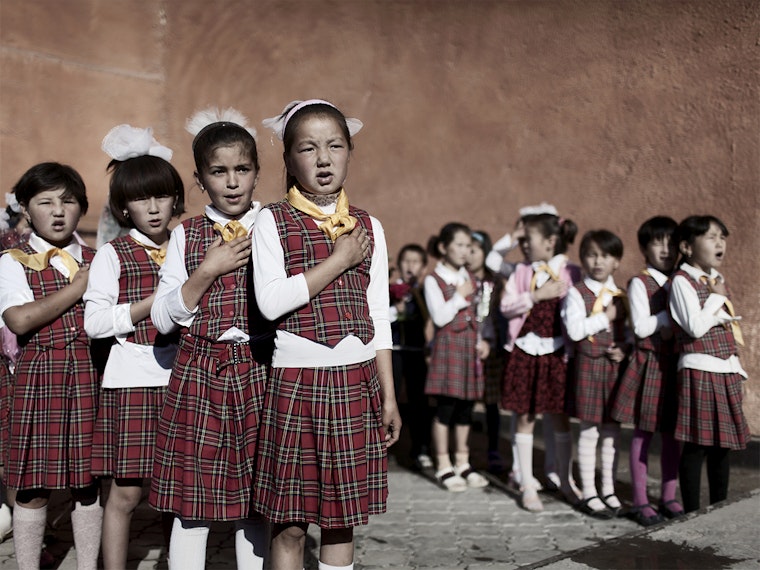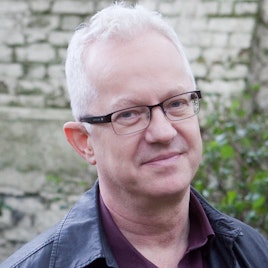Advancing Open Society through Curriculum Reform in Kyrgyzstan
By Hugh Mclean

The government of Kyrgyzstan passed a decree on July 21, 2014, that brought a new curriculum framework into law. The Soros Foundation of Kyrgyzstan (SFK) played a catalyzing role in this development, which has taken seven years of dedicated work. We spoke to Valentin Deichman, who leads the Education Program at SFK, about the reform process.
Why did you decide to pursue curriculum reform as part of the work of SFK?
SFK’s education work has always been focused on teachers. In our understanding, education is all about the essential interaction between teacher and student, for this is where momentum for change needs to be. Initially, we worked predominantly with in-service teacher training, providing relevant learning materials and so on. But such work has natural limitations, as it is not about changing the system. So part of our thinking was to find a way to have a systemic effect.
The other reason for focusing on the curriculum derives from our mission: we wanted to find a way to inculcate the social habits that are necessary for an open society. The question we faced was how to “modernize” in a way that is adequate: to design the content, the outcomes, and the values that we want—without, of course, dropping our emphasis on teachers.
What are some of the key differences in this new curriculum?
We were striving to develop the competencies that are integral to quality education rather than dogmatic content. The competency-based approach is different from traditional post-Soviet systems. Knowledge-based approaches as competencies imply not just profound knowledge of the particular subject area, but an ability to apply this knowledge to solving interpersonal, professional, and other socially relevant problems depending on the context.
Before, the system was tuned to transmit the knowledge and facts to be repeated or interpreted in standard learning situations. Changing formulations and bringing in the different contexts puzzled the students, indicating a lack of critical-thinking skills.
For the development of the new curriculum we focused on three aspects:
- information and content, how to understand we may not have access to all information, and that what we do have must be falsifiable;
- social interaction and communication, how to make these meaningful and constructive for learning and functioning;
- self-organization and problem-solving skills, how to affect personal behavior.
We regard these aspects to be tools that help us function on an interpersonal level and as citizens and professionals. Education must provide the means to build these resources in individuals and for society.
Who did you involve in the curriculum development process?
We knew that we needed to build a core of professionals to help us answer the fundamental question: “What is the actual problem that the reform is supposed to answer?” The involvement of academics enabled us to do this. We also involved the pedagogical institutes and representatives from the Ministry of Education and the Kyrgyzstan Academy of Education. And, of course, we involved teachers throughout the process; their help enabled us to devise subject-specific standards, and to develop and pilot materials that were relevant and corresponded with the standards.
We probably involved over 200 teachers over the period in the various working groups that lasted for a year or two. Academics were helpful in developing content and methodologies for all knowledge domains. We also engaged developmental psychologists to ensure that materials and outcomes were child- and age-appropriate.
What do you think the prospects are for these education reform initiatives to promote a just and open society in Kyrgyzstan?
Kyrgyzstan is experiencing social and political changes that seem to reflect the perception that Western liberal democracy has not addressed the difficulties the majority of the population are facing and is only concerned with advocating for the rights of minorities. In this environment, religiosity, nationalism, and homophobia seem to be gaining ground.
For these reasons, education has a very important role to play in embedding certain key shared values. This is not to say that the educational system cannot or should not come up with an immediate response to the cases of extremist nationalistic or religious outbreaks. It can and should be done with the regular means and available instruments (e.g., extracurricular work, leisure-time activities, youth camps aimed at promoting inclusive school ethos, etc.), but our contribution to the curriculum reform was aimed at planting these values into the formal curriculum to ensure systemic and longitudinal impact.
Education needs to provide us with different strategies for dealing with conflict than historical approaches have done. This is the significance of the secular curriculum framework that has just been adopted. It provides a basis for a non-confrontational style of delivering history and literature, emphasizing the importance of multicultural values and second languages, and it aims at consolidating society around common values.
What stage is the reform process at now?
The government has issued a decree that endorses the curriculum framework for all levels of schooling. This also affects the curriculum for teachers’ pre-service training, which we developed simultaneously so that it corresponds with the school curriculum. There is an action plan in place for the phased implementation of new-generation standards in secondary education in Kyrgyzstan by 2022.

Until December 2021, Hugh McLean was a senior program advisor for the Open Society Education Support Program.